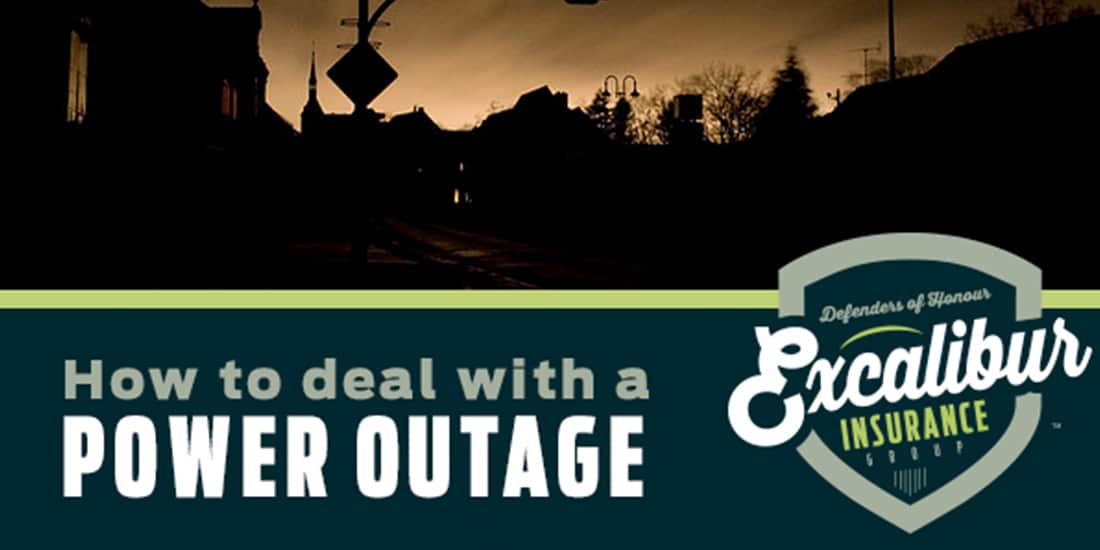
Will You Be Ready For Another Power Outage This Winter?
December 10, 2014
Share:
A power outage that hit South Western Ontario from Seaforth, northwest to Brussels, west to Lake Huron, and east to Parkhill and St. Marys saw 25,000 people lose electricity for a few hours. Over the last number of years, we have seen more frequent power outages, for long periods of time, in Ontario, due to nature’s wrath in the form of windstorms, tornadoes and ice storms. Also power outages caused by system failures or mechanical break downs, like the massive blackout in northeastern North America that crippled Ontario back on August 14, 2003 are still a lingering possibility.
Power outages in the winter bring many challenges. Homes lose heat and electricity, and sometimes running water. Now is the time to start thinking about preparing for these outages to ensure your family can get by when the power is out. When the power goes out for days, and in some cases weeks, you need some tips to stay safe during the power outage. Below are some tips from the Excalibur Insurance Group to make sure you have a plan in place to not be left in the dark during a power outage.
Before The Power Outage
- Have a place in your home where flashlights, a battery-powered radio, and extra batteries can be easily found.
- If you know the outage is coming, set aside extra water and buy or make extra ice. You can use the ice to keep perishable items cool.
- Make sure the battery in your smoke detector is fresh. Test the smoke detector on a monthly basis to make sure it’s working.
- Keep an appliance thermometer in the freezer. If the freezer is 4.4 degrees C or colder when the power returns, all the food is safe.
- Have a back up source of power like a generator
What to do During a Power Outage
- Check your own circuit breaker panel or fuse box to ensure the problem doesn’t stem from there.
- Leave one light on so you know when the power returns
- If possible, use flashlights instead of candles for emergency lighting. Candles used in unfamiliar settings can be dangerous fire hazards
- Check for damaged or fallen services wires leading to your residence. If you spot them, STAY BACK at least 10 metres to minimize the risk of electrocution.
- If neighbors’ homes are also without power, notify your electric supply authority. Do not phone 911.
- Turn off all tools, appliances and electronic equipment.
- Turn thermostats down to minimum to prevent damage from a power surge when power has been restored.
- Turn off all lights, except one inside and one outside.
- Don’t open your freezer or fridge unless absolutely necessary. A full freezer will keep food frozen for 24 to 36 hours if doors stay closed.
- Refrain from the indoor use of BBQs, camping heating equipment, or home generators as they pose a carbon monoxide threat.
- Electrically-connected smoke alarms and carbon monoxide alarms will not work when the power is out unless they have battery back-ups. Make sure your home has battery-operated smoke alarms and carbon monoxide alarms.
- When lighting candles, use proper holders and keep out of reach of children. Never leave lit candles unattended.
- Purchase generators with recognized approval labels. Make sure the unit has proper connection receptacles and circuit breakers
- Portable generators, when used correctly, can provide security and comfort during power outages. If you need to use a portable generator during a power outage, watch this video first for important safety tips
- Portable generators should only be used outdoors and carefully located to ensure that exhaust fumes do not enter the home. Allow the generator to cool before re-fuelling. Refuel the generator outside, following the manufacturer’s instructions. Store fuel for the generator in approved containers, outside the home Portable generators that are permanently installed into your electrical wiring must have a transfer device to protect your home and electric utility workers. The transfer device prevents generator power from flowing back into the power lines connected to your house.
- Portable generators that are permanently installed into your electrical wiring must have a transfer device to protect your home and electric utility workers. The transfer device prevents generator power from flowing back into the power lines connected to your house.
- Make sure electric stove elements and small appliances are OFF or unplugged to prevent fires from occurring when the electricity is restored.
- Cordless phones will not work when the power is out, so it is recommended to have at least one phone that does not require electricity to operate.
Emergency Power Outage Kit
The Canadian government recommends every home be prepared for a power outage lasting at least 72 hours. One way to do this is to come up with a power outage kit to keep in an easily accessible place. The kit should include:
- Contact information for power company (so you can notify them that the power is out). The contact number in Ontario is 1-800-434-1235
- Emergency contact information
- Self-powered or battery operated flashlights
- Candles
- Matches/lighter
- Glow sticks
- First aid kit with bandages, gauze, pain medications, antiseptic ointment, hydrogen peroxide, scissors and tapes
- Prescription medication
- Batteries
- Canned goods
- Can opener
- Water (recommended 2L of water per day per person)
- Self-powered radio
- Car chargers for your phone (your car can be used to power things, just make sure you don’t drain the battery)
- Camping stove (never to be used indoors)
- Propane for your BBQ (should be stored outside away from any source of ignition)
- Warm blankets and clothes
Power Outage Information at Your Fingertips
Hydro One provides detailed outage information online and in the palm of your hand with their Storm Centre outage maps and Hydro One Mobile application.
To download this application for your smart phone or tablet click on the following link http://www.hydroone.com/OurCompany/MediaCentre/Pages/Outages.aspx
Having handy applications and a plan in place to handle power outages will make sure that you will not be left in the dark and you and your family will stay safe until the power is restored. If you have any questions about losses you have experienced to your property, business or farm during a power outage contact one of our Excalibur protection specialist and we will be happy to discuss your protection plan.







